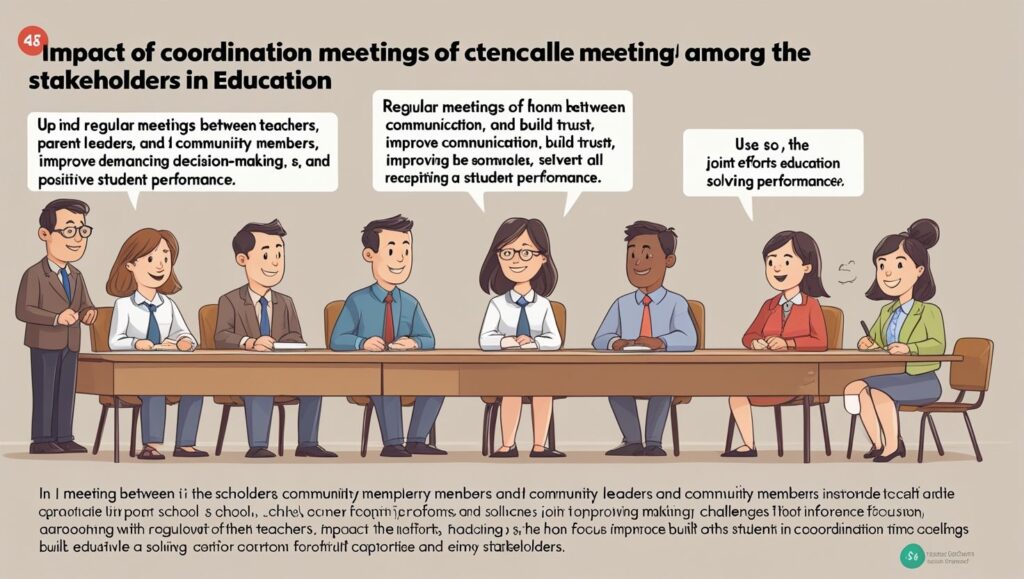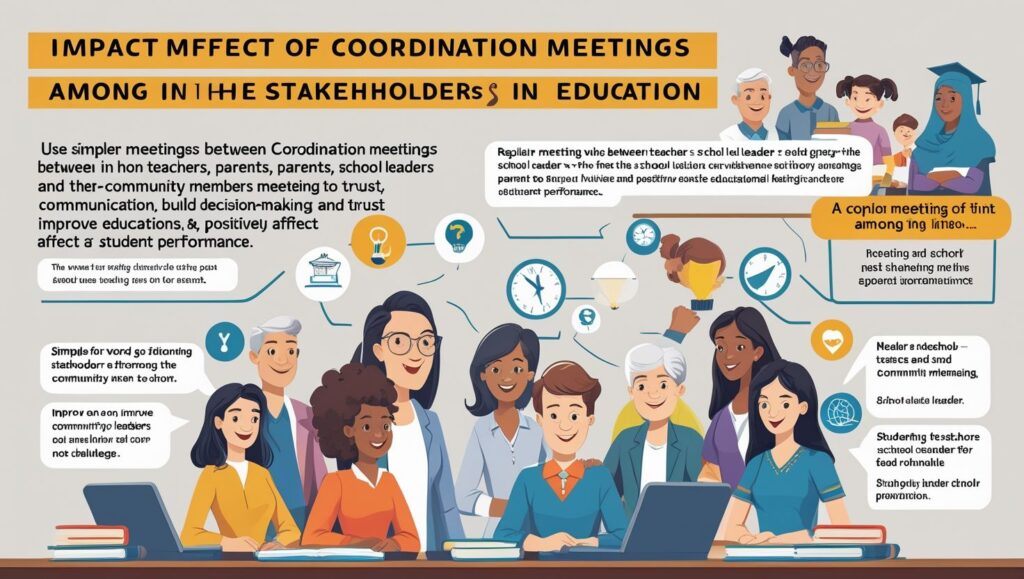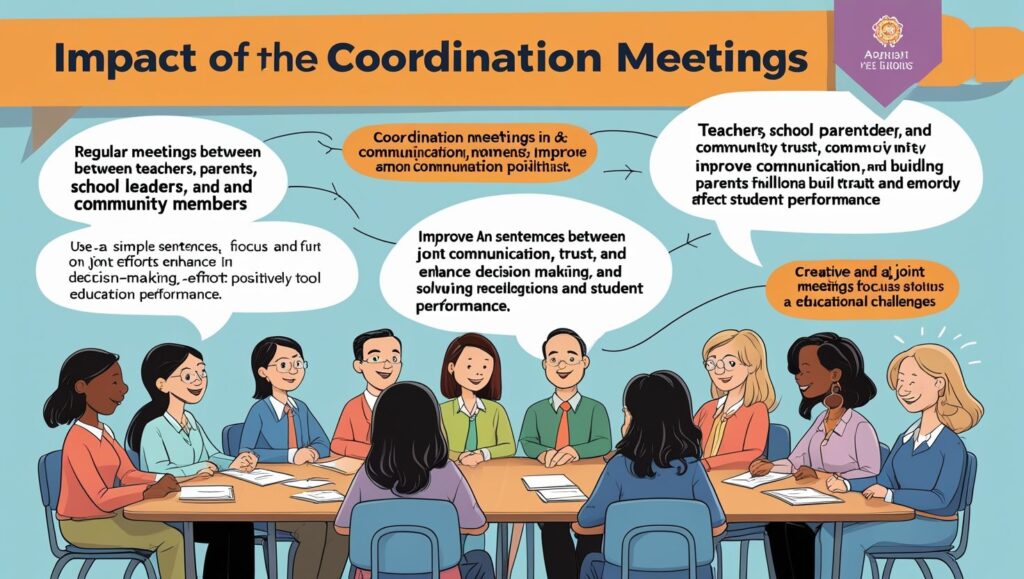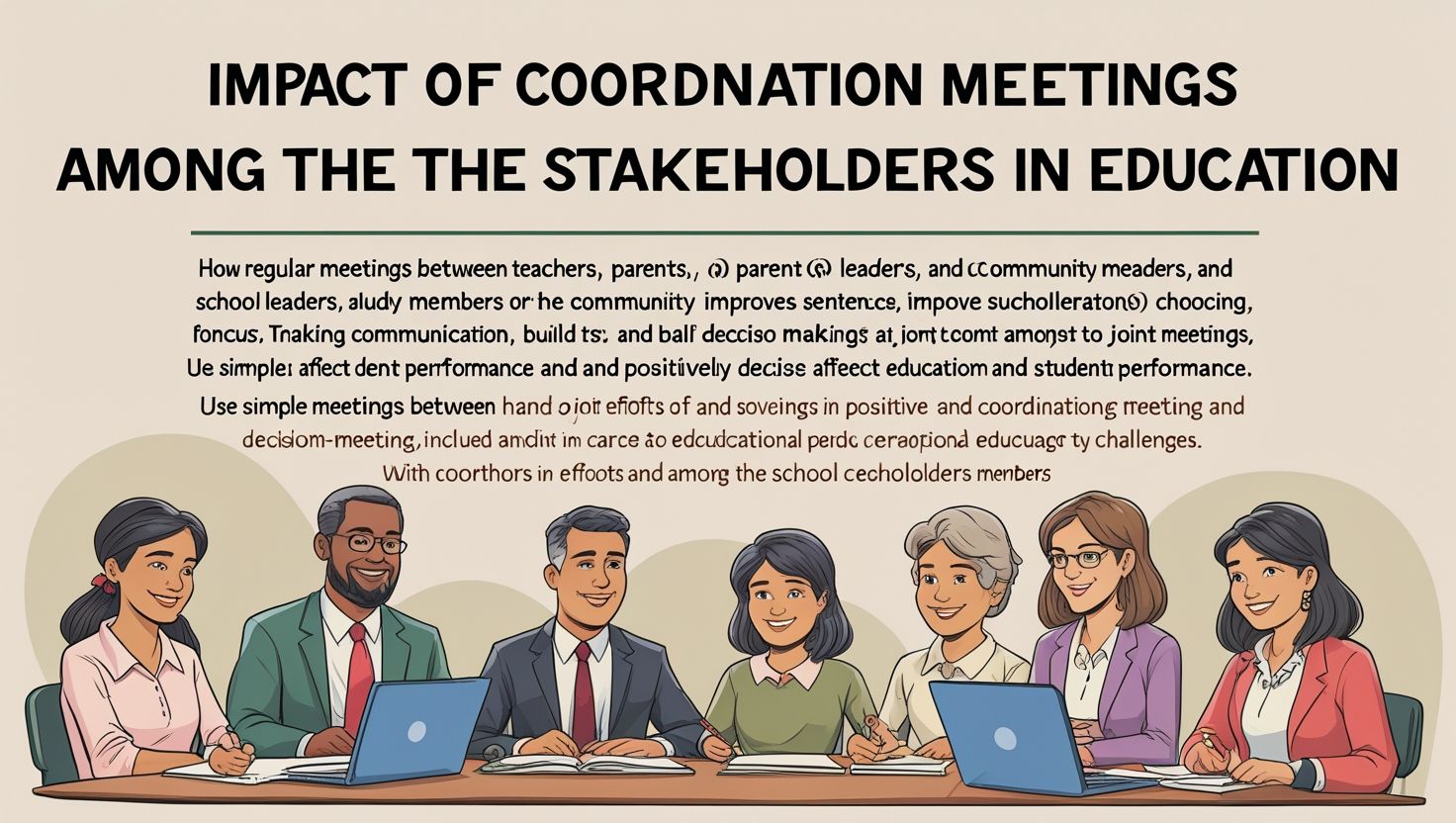Introduction:
Impact of Coordination Meetings Among the Stakeholders in Education, Coordination meetings play a vital role in educational institutions. These meetings include teachers, parents, administrators, community leaders, and policymakers. Together, they discuss the overall progress and challenges in education. In today’s educational environment, communication alone is not enough. In fact, coordination is required for consistency, progress, and meaningful collaboration.
Furthermore, regular meetings help in aligning goals and activities. For instance, a school principal may address discipline issues while a teacher may point out academic concerns. At the same time, parents can share their observations at home. Clearly, each voice matters. Therefore, when all stakeholders meet, their joint efforts become more organized and purposeful.
Moreover, the modern education system faces complex challenges. These range from curriculum reforms to student well-being. Hence, coordination meetings allow for the exchange of insights, opinions, and strategies. In such sessions, trust is built, and common goals are reinforced.
In conclusion, coordination meetings bring unity among diverse stakeholders. Because of their joint input, educational plans become more successful. Although individual efforts matter, coordinated action ensures real progress. That is why these meetings should be regular, inclusive, and action-oriented.
Role of Stakeholders in Education
Educational stakeholders include many individuals and groups. These include students, teachers, parents, administrators, policymakers, and the local community. Each stakeholder has a unique role. However, these roles become more effective when they are coordinated through structured meetings.
To begin with, teachers bring firsthand classroom experience. They know student behaviors, strengths, and academic needs. On the other hand, parents provide insights from home. Administrators focus on managing resources and implementing policies. Meanwhile, policymakers work on legal and curricular frameworks. Lastly, community members often offer social, emotional, and financial support. Through regular coordination meetings, all these voices come together. Additionally, each stakeholder learns to respect and understand the others’ roles. When communication flows openly, decision-making becomes collaborative and effective.
For example, if a student is struggling academically, a teacher’s observation, combined with a parent’s input and administrator’s support, can offer a better solution. Thus, instead of working in isolation, stakeholders become a unified team. In short, when stakeholders are connected, their efforts produce better educational outcomes. Coordination meetings not only encourage teamwork but also build a stronger education system. Ultimately, education becomes a shared responsibility, driven by cooperation rather than individual efforts.

Purpose of Coordination Meetings in Schools
Coordination meetings serve several important purposes. First and foremost, they provide a structured platform for discussion. They allow stakeholders to share feedback, express concerns, and suggest improvements. Therefore, communication becomes two-way and productive. Secondly, these meetings promote goal alignment. For instance, school leaders can communicate annual targets, while teachers can share classroom goals. Additionally, parents may discuss their expectations and challenges. As a result, all stakeholders can move in the same direction.
Moreover, coordination meetings help identify problems early. Whether it’s low academic performance or infrastructure issues, early detection leads to timely solutions. Because everyone contributes, problem-solving becomes faster and more effective. Furthermore, such meetings promote transparency. When decisions are made in a group setting, trust increases. Also, when each stakeholder knows what others are doing, confusion is reduced. This shared understanding enhances collaboration.
Finally, meetings encourage accountability. Since roles are clearly discussed, each stakeholder is reminded of their duties. As a result, performance improves. In essence, coordination meetings are not merely events; they are strategic tools. They connect all aspects of school management, teaching, and student support. Thus, schools that hold regular meetings often show stronger performance and better stakeholder satisfaction.
Improving Communication Among Stakeholders
Effective communication is the foundation of successful coordination. In education, miscommunication can lead to serious issues. However, when stakeholders communicate regularly, misunderstandings decrease. Coordination meetings create such opportunities. First, they provide a common platform. Teachers, parents, and administrators speak directly, which removes guesswork. In the process, intentions and expectations become clear. For example, a teacher can explain a student’s weak areas, and parents can discuss home-based strategies.
Secondly, these meetings promote listening. It is not just about speaking, but also about understanding others. When everyone listens actively, mutual respect develops. Consequently, solutions are found through shared perspectives. Additionally, meetings encourage feedback. A principal can give feedback to teachers, while a parent may comment on school policies. Constructive feedback, when shared respectfully, leads to improvement.
Besides, written communication—like minutes of meetings—further ensures clarity. These records help track progress and remind stakeholders of their roles. Hence, communication becomes continuous and purposeful. In conclusion, coordination meetings are essential to strengthen communication. They connect voices and turn dialogue into action. Because of improved communication, trust increases and cooperation flourishes. Thus, education benefits in every way.
Building Trust and Transparency
Trust is the backbone of any effective relationship. In educational settings, trust between stakeholders is crucial. Coordination meetings greatly help in building and maintaining this trust. By coming together, stakeholders develop respect for each other’s roles and responsibilities. Firstly, regular meetings show openness. When school leaders invite feedback from parents and teachers, it reflects transparency. Decisions are no longer made behind closed doors. Instead, they are discussed openly and clearly.
Secondly, sharing information builds trust. For instance, updates about school performance or student assessments, when shared regularly, keep everyone informed. Consequently, rumors are avoided, and facts take center stage. Moreover, when problems are discussed honestly, solutions are more credible. A teacher admitting challenges or a parent raising concerns in a meeting shows a willingness to cooperate. This open dialogue increases faith in each other.
Importantly, transparency also builds accountability. Each stakeholder becomes responsible for their part. Because their actions are seen and understood by others, they are likely to stay committed. To sum up, coordination meetings are not only about planning. They are also about creating a culture of trust and openness. In such a culture, every stakeholder feels valued and confident.

Addressing Challenges Through Joint Efforts
Every school faces challenges. These may include poor academic performance, low attendance, lack of resources, or behavioral problems. However, when challenges are addressed collectively, they are easier to overcome. Coordination meetings enable joint problem-solving. Firstly, multiple minds bring multiple solutions. A teacher might suggest one method, while a parent or administrator may propose another. By comparing ideas, the best one is chosen. Hence, the solution becomes more refined and effective.
Secondly, joint efforts reduce the burden. No single person feels overwhelmed. Because responsibility is shared, implementation becomes easier. For instance, improving reading skills becomes a team project among parents, teachers, and librarians. Additionally, coordination meetings promote emotional support. Stakeholders realize they are not alone. This collective spirit boosts morale and encourages action. Even difficult issues feel more manageable when handled as a group.
Also, resources can be pooled. A parent might offer time, a community leader may contribute funds, and the school might provide materials. Working together increases resource availability. Thus, coordination meetings turn challenges into opportunities. They transform problems into projects that bring people together. As a result, the school environment becomes more supportive and solutions become sustainable.
Promoting Accountability and Responsibility
Accountability is key in education. When stakeholders meet regularly, their actions become visible. This visibility promotes responsibility and commitment. Coordination meetings are crucial in ensuring that everyone stays on track. To begin with, such meetings define clear roles. For example, teachers focus on instruction, while parents support at home. Principals manage operations, and community members provide external support. When roles are openly discussed, confusion is minimized.
Secondly, regular updates are shared. Stakeholders report on what they have done since the last meeting. These reports create a cycle of responsibility. When everyone is expected to report progress, they are more likely to act. Moreover, accountability boosts performance. When individuals know that their work will be reviewed, they tend to put in more effort. Whether it is about completing homework, organizing events, or improving teaching strategies, commitment increases.
In addition, poor performance or delays are addressed openly. Instead of blaming, solutions are found. Therefore, accountability becomes positive and productive. In conclusion, coordination meetings foster responsibility through visibility and open dialogue. They turn promises into actions and plans into results. As a result, educational goals are more likely to be achieved.
Enhancing Decision-Making and Policy Implementation
Sound decisions shape quality education. When decisions are taken without consulting stakeholders, they often fail. However, coordination meetings lead to better, more accepted decisions. These are decisions that reflect diverse views and shared interests. First, meetings offer a democratic space. Stakeholders can express opinions freely. As a result, decisions are more balanced. They consider different angles and are less likely to be biased or one-sided.
Second, meetings allow data sharing. For example, teachers might share exam results, while parents discuss behavioral changes. This collective data helps in making informed choices. Thus, decisions are based on facts, not assumptions. Additionally, once a decision is made, it needs to be implemented. Coordination meetings help in assigning tasks. Each stakeholder knows their part. Furthermore, future meetings are used to monitor implementation. This cycle ensures that policies don’t stay on paper.
Moreover, joint decisions are easier to accept. When people feel included, they support the outcome. Resistance is reduced, and cooperation increases. In summary, coordination meetings improve both decision-making and policy execution. They promote fairness, logic, and teamwork. Therefore, they are essential for sustainable development in education.

Impact on Student Performance and Well-Being
Ultimately, all educational efforts aim to benefit students. Coordination meetings indirectly but strongly influence student performance and well-being. When stakeholders work together, students receive better support in all aspects. To start with, teachers and parents align their expectations. They understand each child’s academic and emotional needs. As a result, support becomes consistent at school and at home. This harmony boosts learning.
Secondly, issues like bullying, absenteeism, or stress are addressed quickly. Because stakeholders talk regularly, warning signs are spotted early. Prompt action improves mental health and emotional security. Furthermore, coordinated efforts lead to better planning of co-curricular and extracurricular activities. Balanced development becomes possible. Also, when community members join, students benefit from mentorships, donations, or internships.
In addition, students observe adult collaboration. This teaches them teamwork, respect, and civic responsibility. It shapes their character and social behavior. Clearly, coordination among stakeholders creates a positive learning environment. Performance improves because support is unified. Well-being improves because concerns are shared and solved together. In this way, meetings may seem adult-centered but are truly student-focused.
Conclusion:
Coordination meetings should not be optional. They must become a regular part of school culture. In today’s complex world, no single stakeholder can succeed alone. However, together, they can achieve remarkable progress. These meetings connect voices, share responsibilities, and create unity. They build trust, improve decisions, and promote accountability. Additionally, they lead to better outcomes for students—the true focus of education.
Moreover, schools that conduct regular coordination meetings show higher performance. Their staff is motivated, parents are involved, and communities stay engaged. These schools do not react to problems; they prevent them through planning. Nevertheless, for meetings to be effective, they must be well-organized. Agendas should be clear. Participation must be inclusive. Actions should be followed up. In this way, meetings shift from being events to becoming change agents.
To conclude, coordination among stakeholders is not a luxury—it is a necessity. Its impact touches every area of education. Therefore, schools must prioritize and promote such meetings for the benefit of all, especially the learners.

cb3c40
Somebody necessarily lend a hand to make critically articles I would
state. That is the first time I frequented your website page and to this point?
I amazed with the research you made to create this
particular put up incredible. Great job!